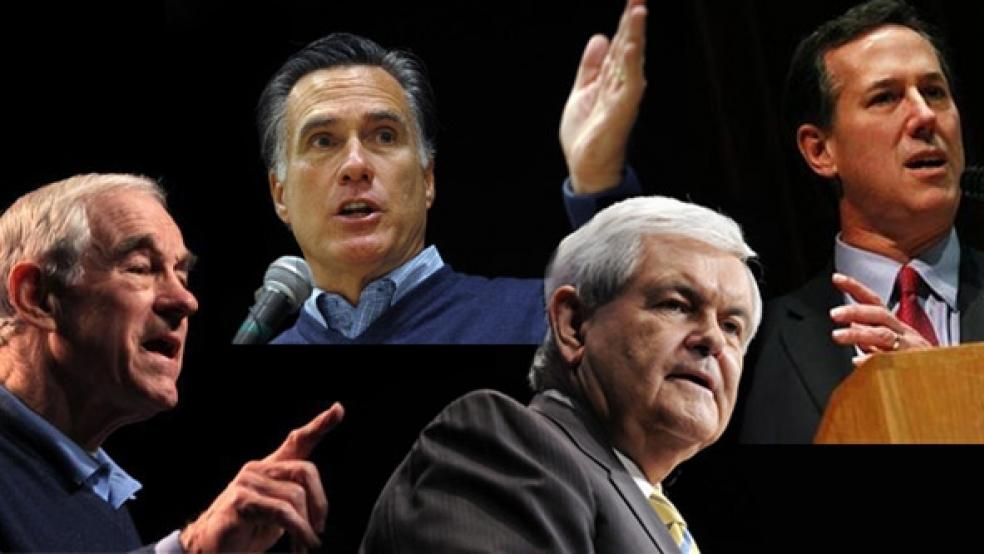Mitt Romney notched early wins as he fought to establish his dominance in the race for the Republican U.S. presidential nomination on Tuesday but Ohio, the biggest prize of the evening, was too close to call.

Romney won as expected in Virginia,Vermont and Massachusetts while rival Newt Gingrich won his home state of Georgia, according to network projections. Results from the seven other states holding contests on "Super Tuesday," the biggest day so far in the roller coaster Republican campaign, were expected in the coming hours. Some 419 of the 1,144 delegates needed to win the party's nomination are at stake.
Polls show Romney has effectively erased rival Rick Santorum's lead in Ohio, a traditional bellwether state that could play an important role in deciding the Republican nominee to challenge Democratic President Barack Obama on November 6. Television networks said the race was too close to call after voting concluded at 7:30 p.m. EST Wednesday. Contests are also being held in Oklahoma, Tennessee, Idaho, Alaska and North Dakota.
A victory in Ohio and a good showing elsewhere would make Romney, a former Massachusetts governor, the favorite to win the nomination. Even without an Ohio win, his strength in other states all but ensures that he will extend his lead in the delegate count. "This is a process of gathering enough delegates to become the nominee, and I think we're on track to have that happen," Romney said after voting in his home town of Belmont, Massachusetts.
A less impressive showing could prompt renewed doubts about his ability to secure the nomination as Republicans continue the state-by-state battle to pick a nominee at their August convention. Romney, who built a fortune of at least $200 million as a private-equity executive, has struggled to connect with conservatives and blue-collar voters in a campaign that has focused on his business career. "He doesn't really know what he stands for," said Santorum supporter Katherine Frenz, 36, of Hilliard, Ohio.
Santorum, a former U.S. senator from Pennsylvania, has won the support of religious conservatives thanks to his opposition to gay marriage and his views on other hot-button social issues. He has fought charges that his Senate career makes him a "Washington insider" and culture warrior who would alienate independent voters.
Former House of Representatives Speaker Gingrich was counting on a win in his home state of Georgia to claw his way back into contention. Ron Paul, a U.S. congressman from Texas known for his libertarian views, hopes to score his first win in Alaska. Santorum is favored in Oklahoma, and he hoped to edge out Romney and Gingrich in Tennessee.
OBAMA WEIGHS IN
Obama stole some of the Super Tuesday spotlight with a rare White House news conference at which he talked about help for struggling homeowners and rising gasoline prices. He dismissed the Republican candidates' threats to take military action to stop Iran's nuclear program as "big talk."
"If some of these folks think that it's time to launch a war, they should say so. And they should explain to the American people exactly why they would do that and what the consequences would be. Everything else is just talk," he said.
As Romney flew home to Massachusetts, Santorum hunkered down in Steubenville, Ohio, home to Franciscan University, a school that shares Santorum's strict approach to Catholicism. Gingrich traveled to Alabama, which holds its primary contest on March 13, before heading back home to Georgia to push what opinion polls show is a flagging campaign.
"The only hope we have to beat Obama is to have better ideas communicated clearly and cutting through his billion-dollar campaign," Gingrich, who represented Georgia in Congress for 20 years, told a business group in the Atlanta area.
Santorum has been vastly outspent in Ohio by a Romney campaign machine that has pelted him with negative ads.
"I am voting for Romney because he is the lesser of all the evils - really I'm voting against Santorum and Gingrich," said Michelle McMahon, a Hilliard, Ohio, student.
In recent presidential campaigns, the Super Tuesday wave of primaries and caucuses has often settled the Republican race. But while this year's contests could establish a clear pecking order, the race is likely to stretch until April or May under new rules designed to attract more voters and boost enthusiasm.
But recent polls indicate the lengthy primary season may actually be alienating voters. An ABC News/Washington Post poll released on Tuesday showed that more voters view the candidates negatively than positively. An NBC News/Wall Street Journal poll on Monday found that 40 percent of voters view the Republican Party less favorably than they did before voting started in January.
Additional reporting by Sam Youngman in Massachusetts, Steve Holland in Ohio and Colleen Jenkins in Atlanta; writing by Andy Sullivan




